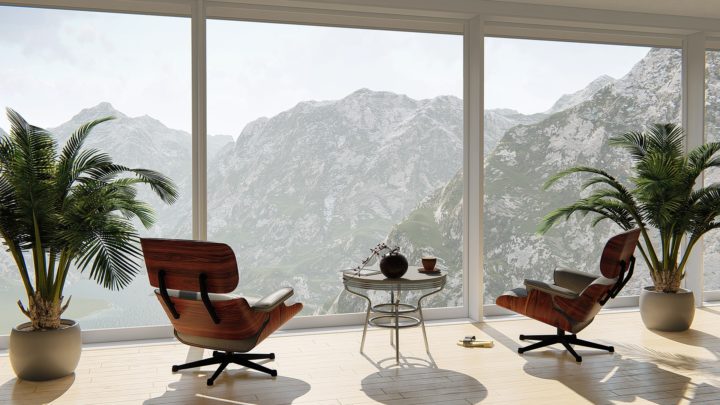The following is a contribution from another author.
We all like to fantasize about our dreams homes from time to time — those luxurious enclaves we would live in if we got the chance, and if finances would allow our imaginations to carry us wherever we wished.
Some people fantasize about living in old French-style castles in the mountains, while others fantasize about living right on the beach in some tropical island paradise, greeted each morning by the calling of gulls and the gentle lapping of the waves against the shoreline.
And, of course, some of us dream of living in Sci-Fi homes from an age yet to come, with all the wonders that modern technology can provide.
But while we all like to dream and fantasize, some of us want to do more than that. Some of us actually start to plan and to begin the process of turning our dreams into reality.
So what if you’re one of those people? What if you’re not content to just dream and fantasize, but actually want — need — to legitimately pursue your dream home as a life goal? Well, if you’ve got the money and means already, then the process might seem relatively straightforward. But if, like most of us, you need to plan and save for a significant period of time in order to attain your dream home, it’s important to form your ideas accurately and to work on them until such a time as you are able to make them a reality.
Here are some tips for planning out your dream home, so that you can actually take the steps needed to one day live in it.
Determine your ideal location, either specifically or by its features
Location makes a truly incredible difference to the kind of atmosphere you will experience in your dream home. A house could have exactly the same structural and design features, but would still feel completely different if it was located by the seaside in sunny Hawaii, or was situated in the frequently chilly and rainy, but no less majestic, backdrop of the Highlands of Scotland.
It might be that you’ve got a specific location in mind already, in terms of country or city. Maybe you’ve determined that you want to live in Indonesia, and have spent enough time researching Rumah to identify a particular city that works perfectly for you and meshes with your vision for the future.
Or maybe you’re committed to staying in your homeland, and that’s a major point of your dream in and of itself. Maybe you’re even determined to stay in your home state or province, for reasons ranging from regional patriotism, to familiarity, to wanting to stay close to your family network.
Then again, it’s obviously also possible that you don’t really have a very defined idea of where you would like to live at all, but only have certain related cultural, environmental, or landmark-oriented cues in mind. For example, “I want to live in the city / in the countryside,”, “I want to live somewhere warm”, “I want my family and friends to live nearby”, etc.
Ultimately, you should give at least as much consideration to the question of where you want to live as to the question of what your home should look like and what features it should contain.
Plan ahead in terms of size — are you expecting or hoping for more additions to the family?
When your dream home itself is likely to be something that you will only be able to obtain at some point in the future, an easy mistake to make can be to project your current general circumstances forward in time, without thinking about the way things might have changed down the line — or more importantly, the way you want things to have changed down the line.
If, for example, you currently have no children but are determined that you want children at some point in the future, it’s no good to plan out a dream home that has no living space for new additions to the family.
Instead, plan for your dream Hallmark Homes Group home according to your dream life. If you want three kids, say, then plan for a house that has space and facilities for a family of that size.
Identify the kinds of leisure features you’d like in your home (in general terms) and identify the space requirements for those
The next thing you should do when considering the size of your home, the room layouts, and so on, is to identify the kinds of leisure features you’d like in your home.
A home, of course, isn’t just a place where you sleep and eat breakfast and dinner. It’s meant to be a place where you feel truly at ease, and where you can enjoy life a little bit with some of the people you most care about.
So, what kinds of leisure features would you like in your home? Do you love tennis and wish you could find more opportunities to play it? If so, then including a tennis court in your plans would be reasonable.
If you’re a tech-junkie, maybe you’d want a fully-furnished home cinema, or a design studio.
Think about quirky features of your home that would set it apart — things that would make it truly unique, and yours
There are certain features you could include in your home which are essentially “generic” — the kinds of things that may be expensive and fun, but which anyone with enough money and interest could have an exact carbon-copy replica of.
As your dream home is, well, your dream home, you might want to take the time to consider what sorts of quirky features you would like to include in your home that would truly set it apart. Things that would make it unique, and uniquely yours.
Maybe you have a particular idea of having a space-efficient home built of wood, with hinging walls and compartments here and there. Or maybe you want your home to include a mock-medieval banquet hall. Let your imagination have a say.
Think about the kinds of technologies you’d like integrated into your home (while keeping in mind that new innovations and changes might be on the horizon)
If you’re reading this blog, then you’re likely already fascinated by what tech can mean for the future, and for your future home.
If you are particularly interested in a high-tech home, it pays to include this in your plans from the earliest possible stage onward, not least of all because certain integrated home technology will ideally require certain structural features in the home itself.
Make a list of the kinds of features you’d like, ranging from lighting and temperature control that can be controlled from your home, to voice-automated doors, and more.
Just allow for the fact that technology is currently developing at an exponential rate, and review and adjust the specifics of your plan as time goes on.
Consider the degree to which you want to be self-reliant in your home versus dependent on the local grid
This is a big question, and will have a lot to do with your natural tendencies, and the area in which you live, or foresee yourself living.
Are you happy to be fully “on-grid”, relying on the conventional outlets for electricity, water, waste disposal, and so on? Or are you fascinated by the prospects of self-sufficient low-waste living?
In the case of the latter, you will want your plans to account for things like access to underground aquifers, on-site generators, garden space for growing your own vegetables and so on.
Audit your vision routinely to focus it on the key features and keep it within the realm of the meaningful
Even the best plans can end up straying from the path when they seem detached from the immediate realities of life in the world today.
When you are planning your dream home for some point in the future, one potential pitfall that you should be mindful of, is treating your planning for your dream home as a pure fantasy project, which ignores all questions of logistics or application in the real world.
If you find yourself noting down plans for a dream home with illustriously over-the-top features such as “I want it to have gold-plated toilet seats”, and “it needs have at least a hundred bedrooms, and be surrounded by a moat”, you need to pause, take a deep breath, and ask yourself what the point of this exercise ultimately is.
Are you pursuing a vision that you intend to meet within the foreseeable future and which you can begin budgeting for today? Or are you simply detaching the idea of your dream home from all concepts of applicability, and treating it like a fun fiction-project to occupy your imagination on dull afternoons and during rainy weekends?
You should, of course, be ambitious in your planning. Your “dream home” should be a special place, after all. But it should also be a place you actually have good prospects of living in down the line.

















Awesome post, I enjoyed more..
Great tips shares, Sci-Fi homes from age yet to come, with all the wonders that modern technology can provide.